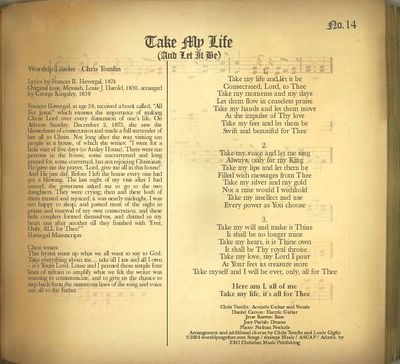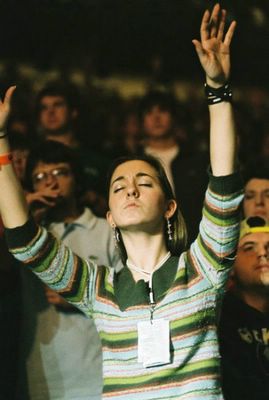Worship: moving beyond hymnals

Take My Life (and Let It Be) 
I was intrigued by my hometown's Tennessean newspaper's article this morning about how worship in church is moving beyond physical use of the published hymnals. The article cites how other music products and services have resulted in a lesser role for the book during church services. Overhead, slide or computer projection as well as printed inserts and downloadable resources has made turning to page 236 in the hardback hymnal less likely.
I agree with Pastor Robert Morgan's statement: "Christians have two books — the Bible and hymnbook, and they need to be side-by-side on their bookshelves or their bedside table." There is great theology and richness in reading classic poetry set to music.
With more contemporary music entering worship services and even use of "parody" type songs to provide a connection to the unchurched do pop up from time to time. As an example, "Sweet Home Alabama," the Lynard Skynard song has been retooled to "Sweet Home Up In Heaven." This song greatly embarrasses me when I hear it, but as for others new in their faith, can serve as an entry point to engage with God. Someone has defined, "Worship seeks union with its beloved; an active effort to close the gap between our heart and the God it adores, is worship at its very best."
John R. Throop in his article "Old Hymns, Contemporary Context" writes: Hymns are indeed a distinctive type of church music. Yet after a generation or two of secularization and the widespread availability and accessibility of popular music-including the amazing growth of contemporary Christian music-hymnody seems isolated in a subcultural music ghetto. This is unfortunate because of the hymn's remarkable ability to communicate essential biblical truths.
The spiritual seeker, especially those in Generation X or subsequent categories, has little patience with music that does not reach them intuitively. Very often, those that lead worship conclude that in order to attract the seeker's attention, music must be written in the cultural vernacular of the day.
The Origin of the Hymn
Hymns began as statements of theological truth. The Psalms are hymns. The texts found in Philippians 2:6-11 and II Timothy 2:11-13 are Christological hymns thought to have been sung during early Christian worship settings. The book of Revelation is filled with similar songs of the early church. As the church progressed into the fourth century, hymn writers found themselves engaged in the defense of orthodoxy as they battled heretics in something akin to a theological sing-off. Where the music captivated the listener, the theologically intricate lyrics communicated solid biblical truths. - John Throop
Thankfully, hymns are being revived in a fresh way via a musical offering that I believe will be around for 100 years - "Passion: Hymns Ancient and Modern". I love the way that a new generation of worshippers, especially of college age are embracing hymns rearranged in a fresh and honoring way via contemporary church worship services.Fresh from the past, "Passion: Hymns Ancient and Modern" is a celebration of the centuries old confessions of the Church, rich songs of faith and tradition that have anchored believers through the ages. Though almost all over 100 years old, these classic hymns pulse with new life as lead worshippers Charlie Hall, David Crowder Band, Nathan and Christy Nockels, Chris Tomlin and Matt Redman fuse old and new in their unique styles—artistry and history wed seamless expressions of praise to the God of the ages.
The church is at its best telling the unrivaled story of God in language contemporary culture can relate to and absorb, while embracing the heritage of faith which has anchored believers through all generations. Fresh from the past, "Passion: Hymns Ancient and Modern", seeks to do just that—celebrating 14 historic confessions of the Church—each wrapped in modern musical skin, yet echoing the anthem of centuries of worshippers gone before.
Learn about, view and listen to Passion: Hymns Ancient and Modern here
The Cyber Hymnal
I was made to worship 

No comments:
Post a Comment